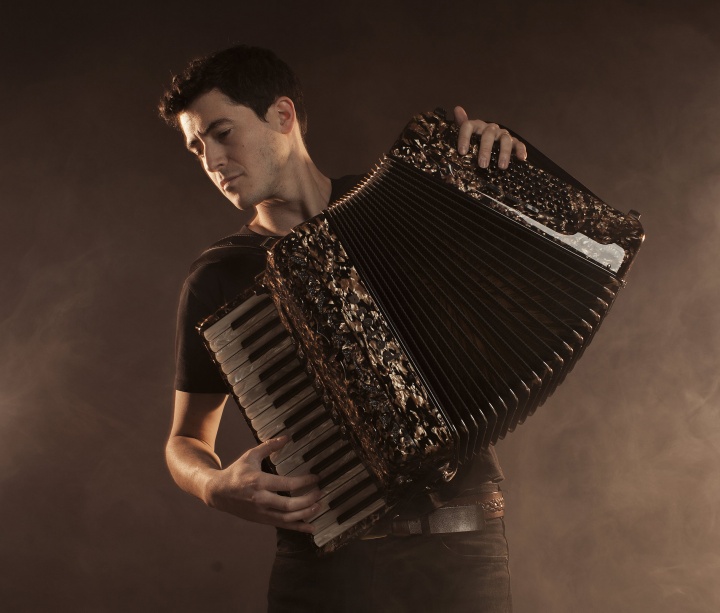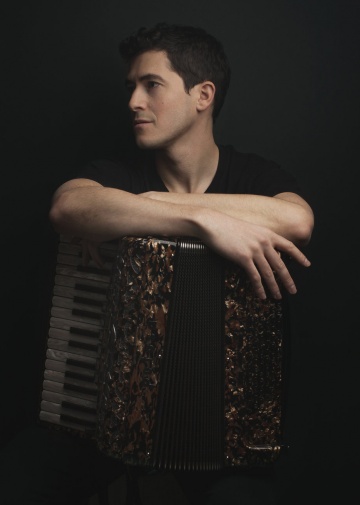Columbia College | Columbia University in the City of New York
“Around the World with an Accordion” by Sam Reider ’11
Whenever I need to remind myself why I’ve chosen the nomadic and financially rickety career path of touring musician, I return in my mind to a night in Beijing. My band and I had been on stage in front of 800 university students, trading licks with the Mongolian rock group Haya. The song was an anthem in a language I didn’t know, but everyone in the audience seemed to understand well enough to sing along. I droned away on my accordion, smiling ear to ear and imagining that the sound in the room would never end. When we finally walked offstage, Haya invited us to a late-night feast to celebrate.
We pulled up in front of an unassuming restaurant and climbed the stairs to the second level. A table was laid out for 25 people with an entire roasted lamb spinning slowly in the center. The largest Lazy Susan I’d ever seen rotated yak butter, lamb soup, noodles, mysterious cheeses and vegetables. The Mongolians poured shots of baijiu, the clear Chinese grain liquor that gives you a hangover before it even touches your lips. Someone pulled out a guitar and we passed it around the table, trading American and Mongolian pop songs. Everyone drummed on bowls with chopsticks and joined in on the choruses in English, Mandarin, Mongolian, Kazakh and French. It was almost morning when we said goodbye and staggered back onto our bus, while the Lazy Susan kept spinning and the music ricocheted behind us in the hazy Beijing dawn.
More than practicing, recording, or performing, it’s these moments of exploration and discovery that I value most in music. Most aspects of tour life are unglamorous — flight delays, endless car rides and life away from family — but every now and then, an unexpected musical connection fills me with wonder at the enormity and mystery of the world.

EVAN FELTS
The summer I graduated, my nascent folk trio — born out of those guerilla couch concerts — embarked on a monthlong odyssey to the West Coast and back. It was our first taste of life on the road, and we relished every grungy minute. From dive bars to sailboats, gas station back rooms to teepees and rockabilly festivals, we played just about the best, worst gigs in the country. Everywhere felt as far removed as possible from the swanky jazz clubs of the Village or the antiseptic practice rooms of the College music department. When we got back home, we vowed to our girlfriends never to tour again.
That promise was short-lived. In 2014, I was on a plane to Phnom Penh, Cambodia. The same group that had gotten its humble start in America’s seediest dives had evolved into a more official outfit and been selected by the Department of State to be ambassadors of American music abroad. On our first trip we traveled to Cambodia, China, Laos, Myanmar and Vietnam. That memorable night in Beijing was one of about 40, each stranger and more delightful than the last. I returned home with a serious travel bug and a distinct sense that the accordion could be my entry point to the rest of the world.
Since then, I’ve performed in several other countries through the State Department’s program and on my own. When I’ve traveled as a tourist, I’ve often felt that my presence has been defined by being a consumer, but touring as an artist provides a unique opportunity to give as well as take. In our role as “musical ambassadors,” our political impact has been relatively minor — we are not delivering aid, resolving armed conflict or building housing infrastructure. But the more I get to travel and perform, the more I become aware that robust diplomacy begins with a simple gesture of mutual understanding. Music provides the initial spark that can ignite a long-lasting, fruitful relationship.
Recently I’ve grown interested in facilitating this type of diplomacy at home as well as overseas. For the past year I’ve been working with Venezuelan cuatro virtuoso Jorge Glem. When I first started going to Jorge’s apartment in the South Bronx, he spoke very little English and I spoke even less Spanish. Our sessions consisted almost entirely of playing music. If one of us really wanted to communicate something, we’d type it into Google or call a friend to translate. Despite this, we found enough common ground through the accordion and the cuatro — and healthy doses of arepas and beer — to begin performing together.
It’s not easy working with someone when you don’t share a language or background. However, I’ve come to value this challenge as a great opportunity. Standard education stresses fluency as a prerequisite for communication. But so often in music, limitation itself provides the most fertile ground for collaboration and discovery. I never thought I’d play the accordion — which is a far more limiting instrument than the piano — but the damn thing has taken me all around the world.

EVAN FELTS

